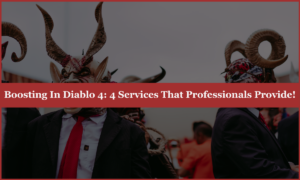CEO Who Took A 90% Pay Cut to Raise His Staff’s Minimum Salary To $70,000 Shares How It Changed Him and His Team
When we hear about CEOs or bosses, we usually hear that they are mean and corrupt. They make sure to make the lives of their employer’s hell by either giving them no sick leaves or by overworking them. But amidst this pool of corrupt and selfish CEOs, we have found our superhero now.
Gravity Payments, a credit card processing, and financial services firm, is co-founded and led by Dan Price. When Price declared in 2015 that his employees would get a minimum wage of $70,000, the firm made headlines across the world.
Dan reduced his personal $1.1 million salary by 90% to fund this move. This choice drew a lot of flak at the time, but the firm is prospering now, and Price claims it has made him a happier and better CEO.
He says that before 1995, the poorest half of the U.S. population had a bigger share of the country’s wealth than the richest 1 percent. But in that year, the top 1 percent made more money than the bottom 50 percent. And the gap keeps getting bigger.
In 1965, CEOs in the US made 20 times as much as the average worker. By 2015, that difference had grown to 300 times (in the UK, the bosses of FTSE 100 companies now earn 117 times the salary of their average worker).
Price had an idea as he and Valerie walked through the crisp mountain air. He had read a study by Daniel Kahneman and Angus Deaton, both of whom had won Nobel Prizes in economics, about how much money an American needs to be happy.
He told Valerie right away that he would raise the minimum wage at Gravity by a lot. When he did the math, he came up with the number $70,000. He realized he would have to not only cut his salary but also put his two houses up as collateral for a loan and give up his stocks and savings. He got his staff together and told them what was going on.
He thought there would be cheering, but Price says that the first time the announcement was made, it was kind of a letdown. He had to say it again and again for it to sink in how bad things were.
Dan laughs now about how he missed an important part of the Princeton professors’ research. $75,000 was the amount they thought people need to be happy. Still, the salaries of a third of the people who work at the company would be doubled right away.
Gravity has changed since then. The number of employees has doubled, and the value of payments processed by the company has gone from $3.8 billion a year to $10.2 billion. But Price is more proud of other measurements.
“Before the minimum wage went up to $70,000, we had between 0 and 2 babies per year on the team,” he says. We’ve had more than 40 babies since the announcement, which was only about four and a half years ago.
In one of the most expensive cities in the US to rent, more than 10% of the company has been able to buy their own home. Before, this number was less than 1%. “There was some worry among the pontificators out there that people would throw away any gains they made. And we really haven’t seen that, “says Price.
The amount of money that employees put into their pension funds on their own has more than doubled, and 70% of employees say they’ve paid off their debt. Price did get a lot of criticism, though.
Along with the hundreds of letters of support and magazine covers calling him “America’s best boss,” many of Gravity’s own customers wrote handwritten letters to complain about what they saw as a political statement.
At the time, Seattle was talking about raising the minimum wage to $15, which would have made it the highest in the US. Small business owners didn’t like it because they said it would put them out of business.
Rush Limbaugh, a right-wing radio host who Price used to listen to every day when he was a child, called him a communist. He said, “I hope this company is used as an example in MBA programs to show that socialism doesn’t work because it won’t work here.”
Two senior employees at Gravity also quit in protest. They weren’t happy that the wages of new employees suddenly went up, and they said it would make them lazy and make the company less competitive.
This hasn’t come about.
Table of Contents
How it all started:
It was the end of 2011. Haley, a 32-year-old phone technician with a yearly salary of around $35,000 per year, was in a foul mood. Price had seen it and approached Haley when he saw her outside on a cigarette break. “Something seems to be troubling you,” he remarked. “Can you tell me what’s on your mind?”
“You’re taking advantage of me,” Haley said. Price was caught aback by the news. Haley is timid and doesn’t have a lot of outbursts. Price explained that Haley’s salary was based on market prices. But he was shocked to know this wasn’t the case.
A considerable number of employees in corporate businesses are ripped off. It may seem like it’s supposed to be like this, but that isn’t the case. Corporate salaries aren’t based on the need or the skill of an employee. Instead, they are based on how little can fill the necessities of the employee.
Price wanted to change this injustice employees face every month when they receive the bare minimum to make ends meet.
Meet Dan Price, the CEO of Gravity Payments, who just celebrated six years of having cut his pay by a million dollars to increase his employees’ wages

Price created a considerable stir when he made the news to his 120-member team, asking NBC News and The New York Times to cover it. It’s even a movement. There were 500 million interactions on social media, and NBC’s video became the most shared in network history.
In addition, Gravity Payments was inundated with testimonials from grateful employees throughout the country who had received increases from newly converted employers.
Most significantly, Price had injected so much fuel into the dispute over how much workers should be paid that it is still raging throughout the business landscape across the world.
Recently, he turned to Twitter to explain what inspired him to make this bold move.
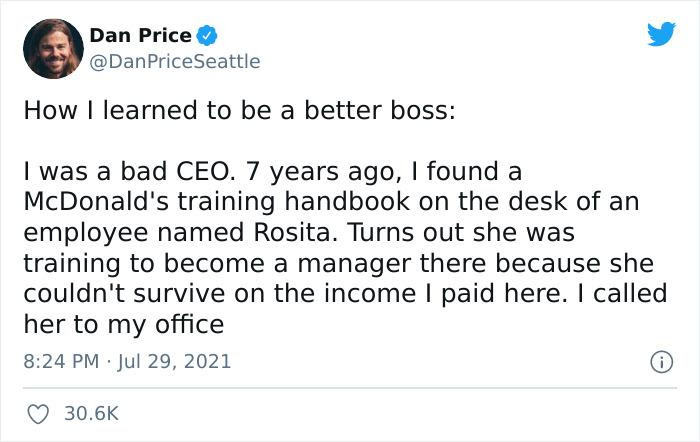
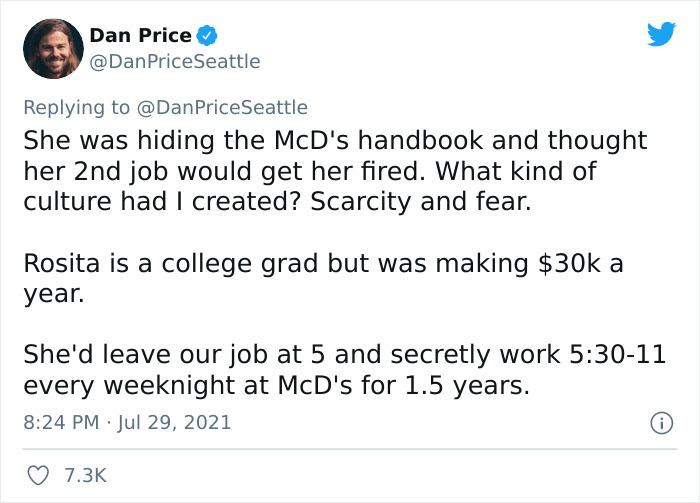
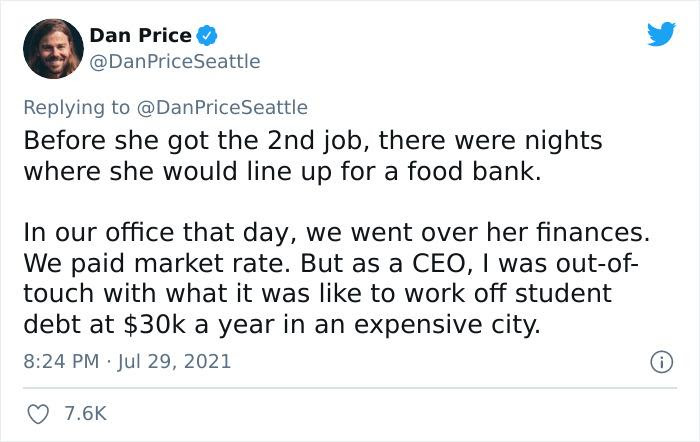
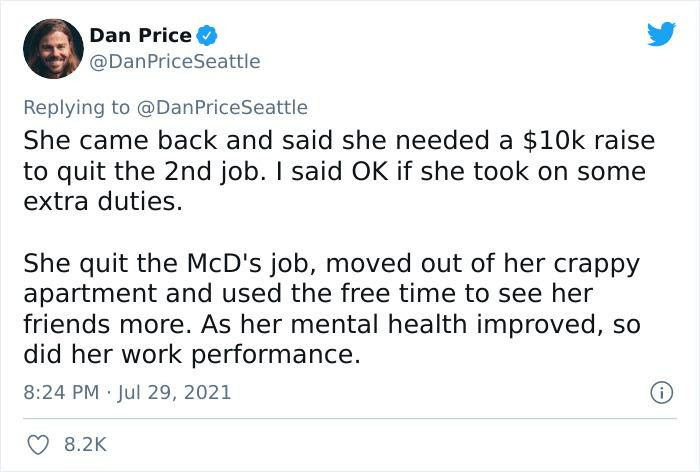
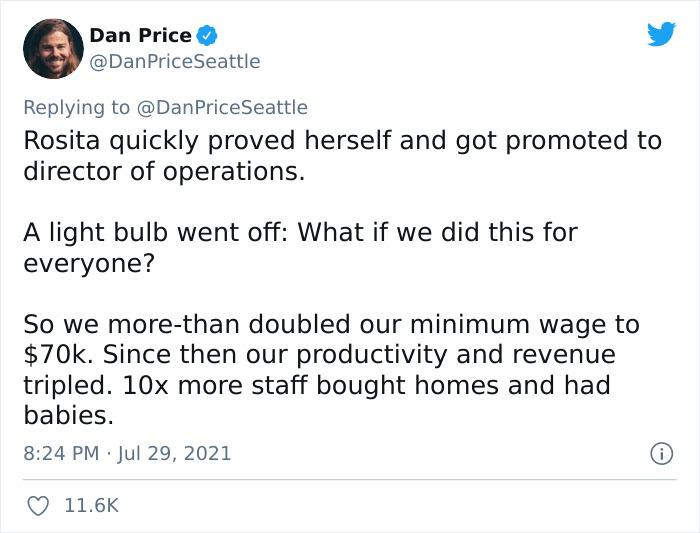
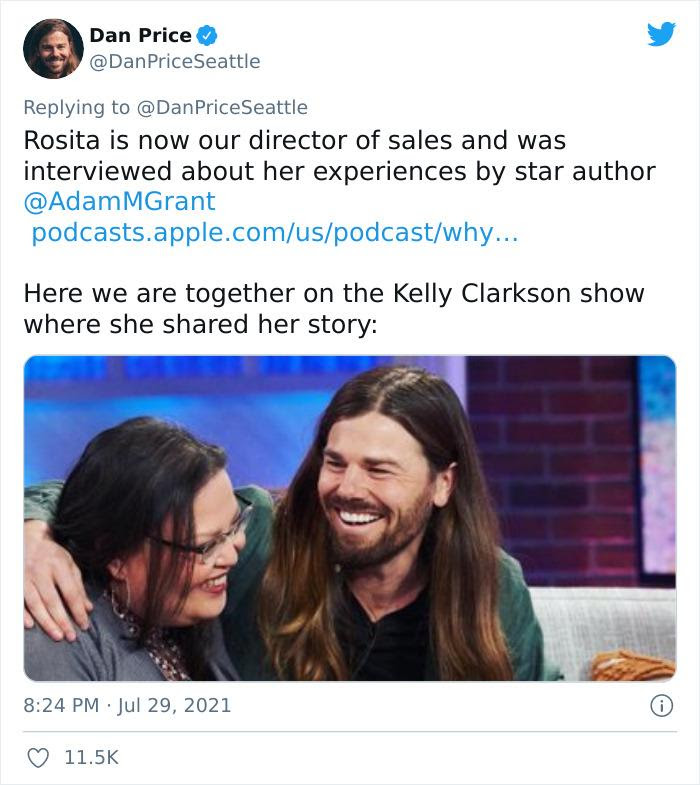
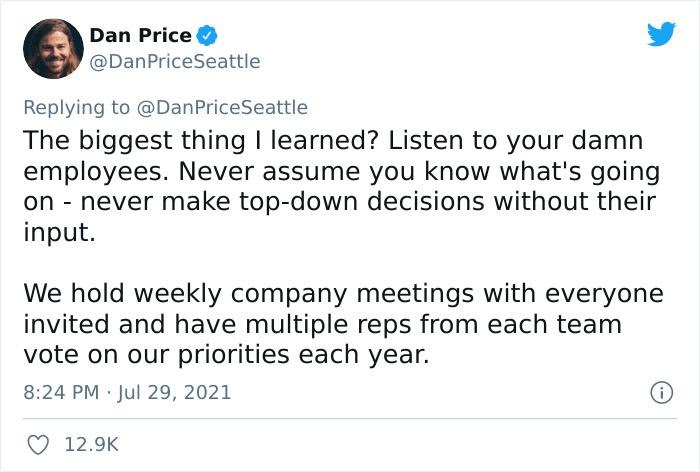
Price, like a white crow, stands out from the rest so far. According to a study by the Economic Policy Institute, the average CEO compensation is 271 times that of the average American worker, who earns around $58,000 per year.
Even though some say that CEO compensation is based on experience and the heavy demands of the job, the study reveals that this is not the case.
According to the research, “CEOs are paid more because of their authority to decide compensation, not because they are more productive, have a particular skill, or have more education.”
“Exorbitant CEO compensation means that the benefits of economic development do not trickle down to ordinary people, because higher CEO pay does not equate to higher output.”
Gravity Payments is thriving
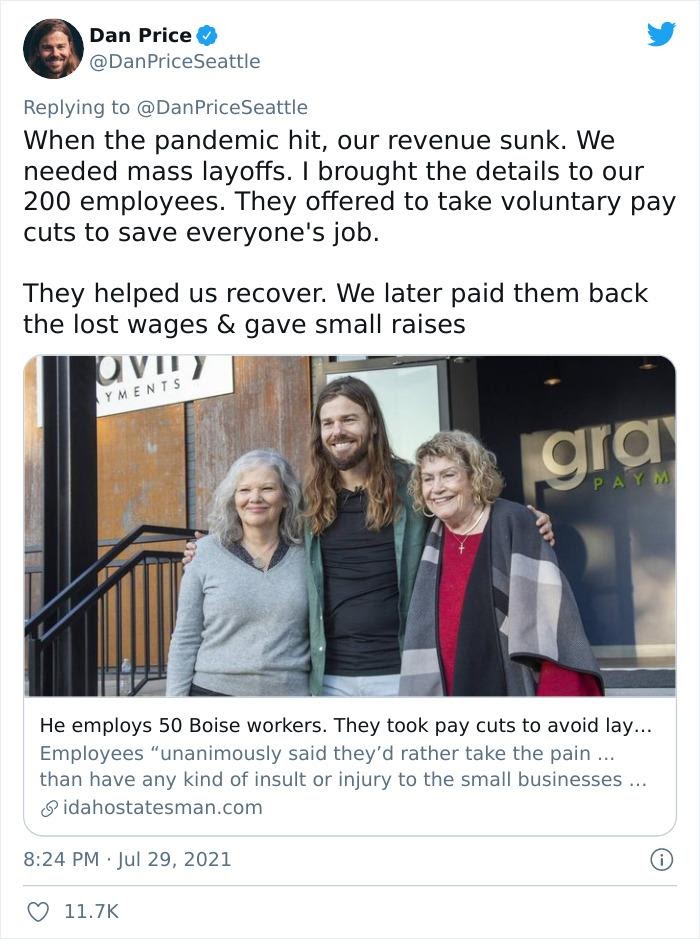
Because Price has been sincere and honest with his employees, they value him a lot. In desperate times, they had to go for desperate measures.
But the whole office was in this together. Just like any other business, Price’s company also took a hit, but the entire crew united to fight this together. This is what happens when you offer your employees fair pay.
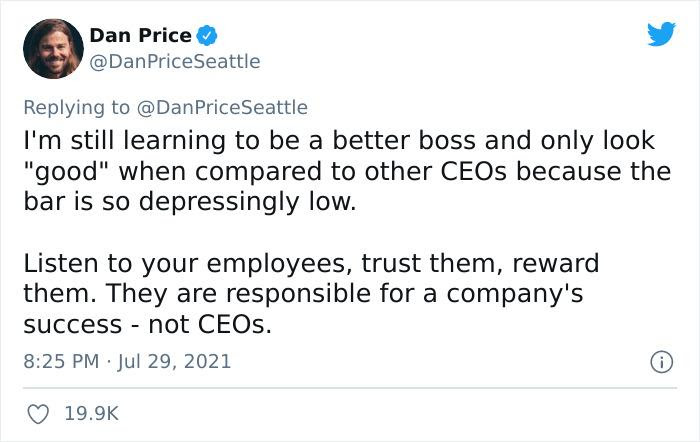
Price thought that his practice would prove an example for all the other CEOs and people in business, but that wasn’t the case. He was shocked to see that no mass culture change followed because many CEOs aren’t willing to give their employees the comfort and paycheck they deserve.
As a thank you, Dan’s employees bought him a new Tesla

This is what happens when you listen to your workforce and improve their living conditions. These people are now loyal to Price, and they realize the worth of his project and company.
Price makes sure to constantly revise the policy on salaries; he knows that it’s essential to take care of the people. This ensures that everyone in the company is paid equally and according to market standards.
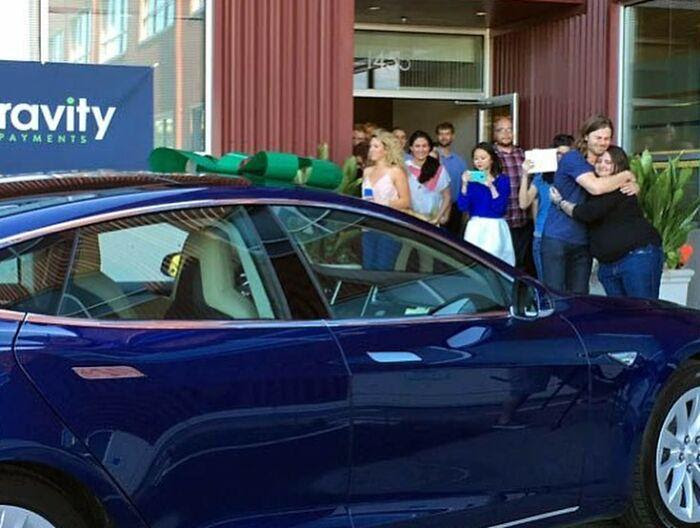

People love Dan Price for the revolution he has brought. Now, many people share their stories of how their bosses treated them when they complained about their small paychecks.
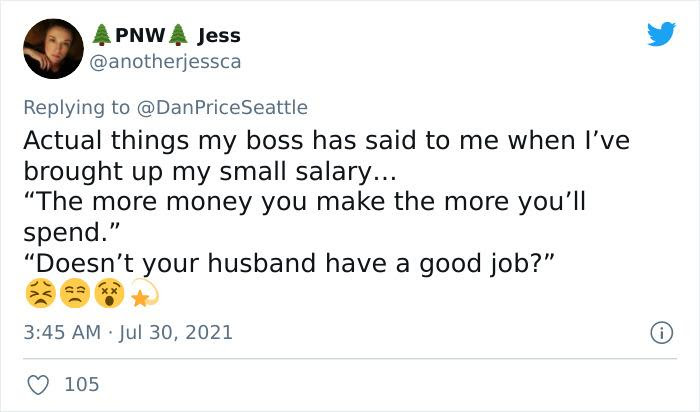
Dude, admit you cannot pay her well. This sexism is awful.
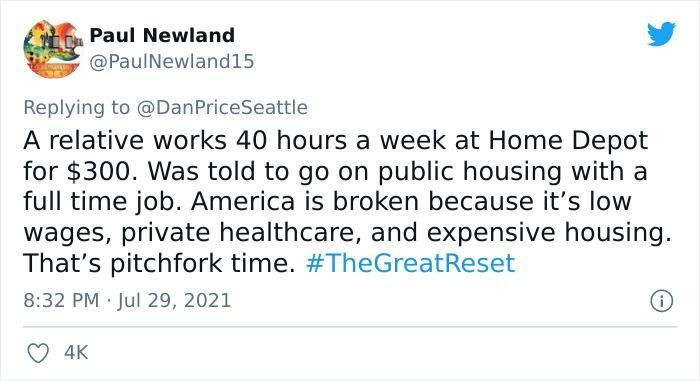
This is sad. People give their whole lives to a job that doesn’t even pay them well. But who can we blame other than capitalism and corporate culture?
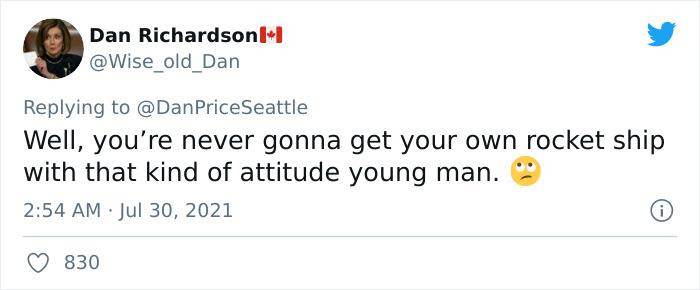
This person’s boss told him that asking for more salary is unethical.
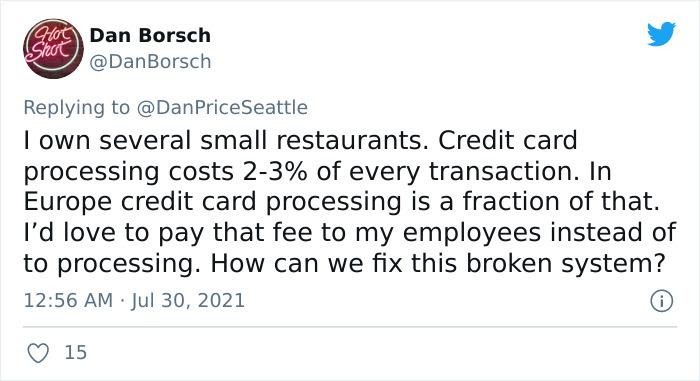
This is another CEO who Dan Price inspires. Now, they also want to make changes in the lives of their employees.
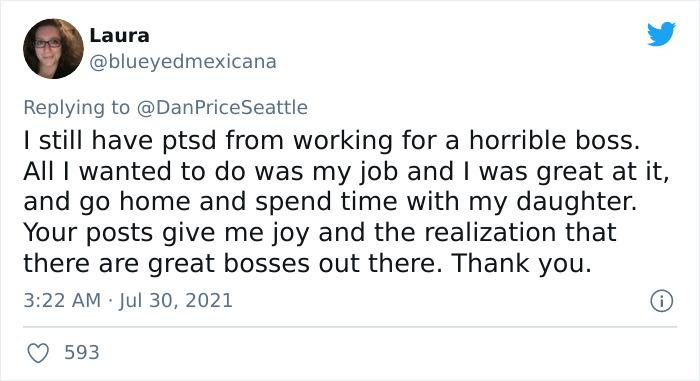
Sometimes, a bad salary and low-income jobs can do permanent mental health damage.
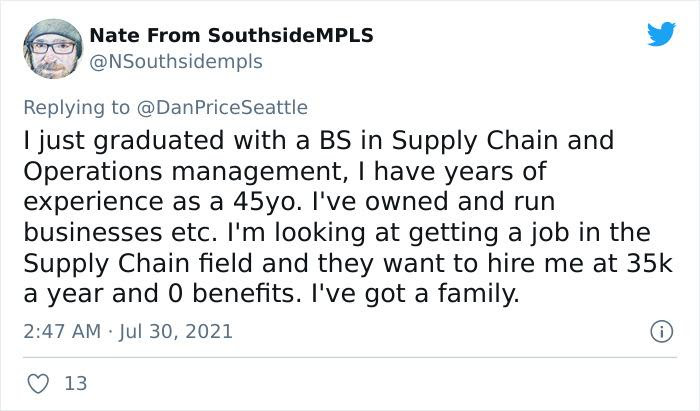
The terrible thing is that beginners are paid pennies. Companies don’t realize that people have families to feed. The selfish culture of nipping other people’s salaries even when they are well-qualified is awful.
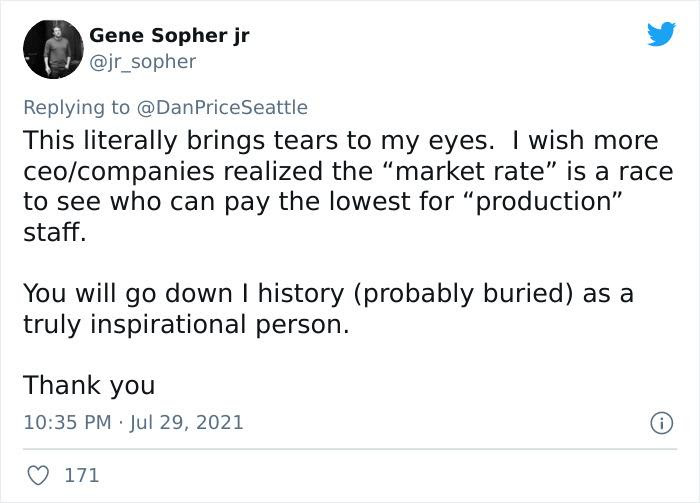
We all want a boss like Price who cares about us and our responsibilities.
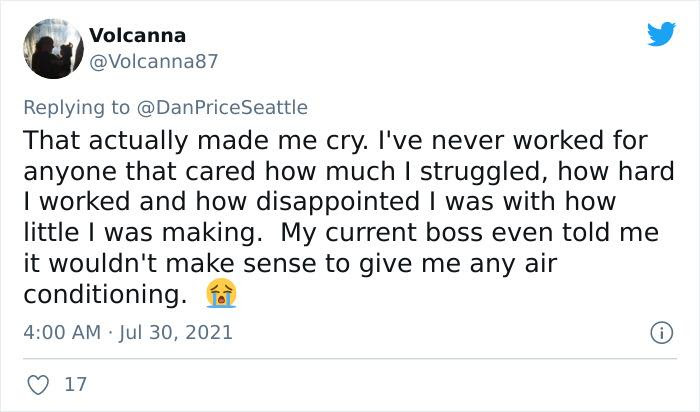
What Price has done is pretty unusual and affectionate. People are now emotional.

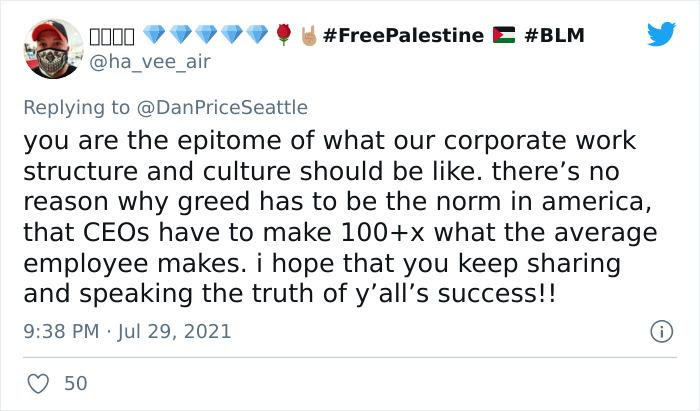
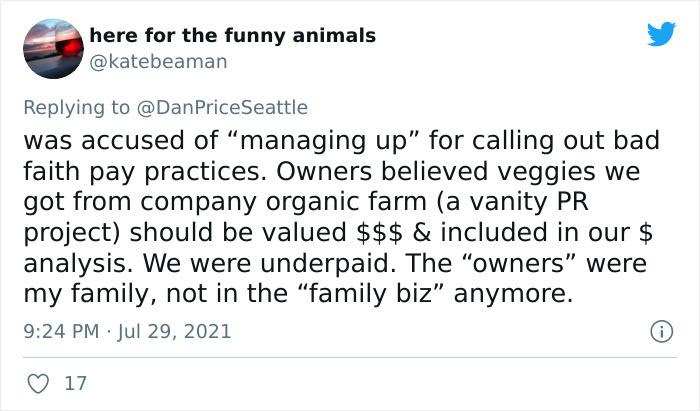
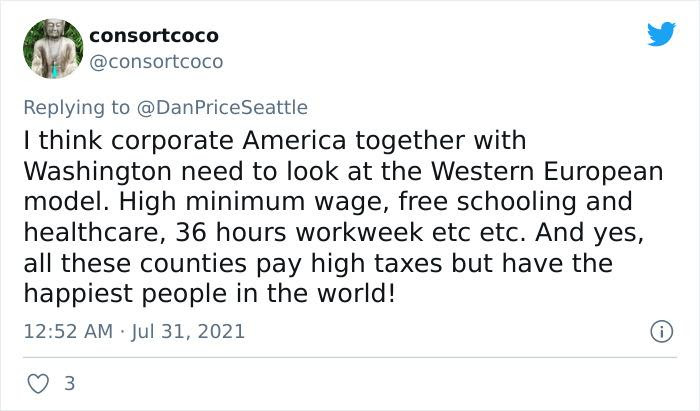
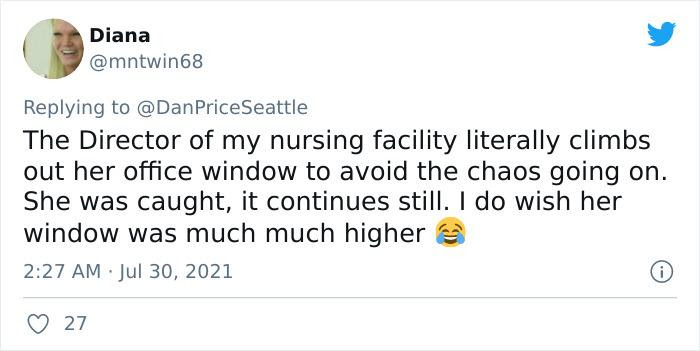
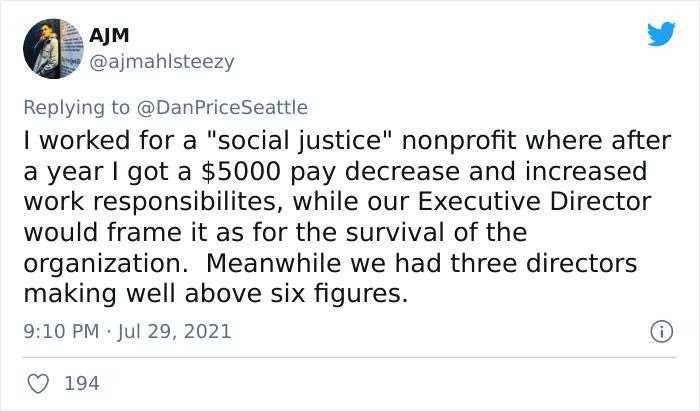
Values and how they change the Culture
The way people in an organization act on or talk about their personal values helps to create a shared meaning that makes up the organization’s culture.
The rules and rituals of a group show what its culture is like. There are three types of culture that are common in many organizations.
- Innovative, shown by behaviors that are entrepreneurial, creative, and willing to take risks.
- When something is bureaucratic, it is based on rules, consistency, and structure.
- Support is seen in relationships based on trust, encouragement, and working together.
Each type of culture is linked to a different set of values that the CEO should have. CEOs are mostly responsible for an organization’s success or failure, so it’s up to them to make sure the organization’s culture can keep up with changes in the organization’s environment.
The ways in which CEOs can change an organization’s culture are likely to reflect some of their own personal values. The three types of organizational culture are best matched with the following sets of personal values:
- Self-direction means making your own decisions, being able to think freely, and being independent.
- Security means being stable, keeping order, and being able to plan ahead.
- Benevolence means caring about other people, meeting their needs, and building relationships that help each other.
- So, here’s how the three value sets match up with the three cultural types:
- CEOs who value self-direction tend to run companies that are very innovative.
- CEOs who care a lot about safety usually run very bureaucratic companies.
- CEOs who value kindness tend to run organizations that are very helpful.
CEO Values and the Results of an Organization
- The values of the CEO affect the organization’s culture, which in turn affects how well the organization does. The values that a CEO instills in an organization’s culture have a big impact on how things turn out.
- CEOs who value self-direction and run innovative businesses tend to see things like high sales growth.
- When CEOs who care about security run bureaucratic organizations, they tend to get results like efficiency, but sometimes they get low employee satisfaction.
- CEOs who put a high value on kindness and who run organizations with a lot of support tend to see things like higher employee satisfaction.
- There is a clear link between the values of the CEO, the culture of the organization, and the likely performance results. Not as likely are other possible combinations of value dimensions, cultural aspects, and performance outcomes. For instance, bureaucratic organizations that put a lot of emphasis on stability and predictability are not likely to encourage creativity and taking risks. In the same way, organizations that put a lot of emphasis on their employees’ needs are likely to have trouble promoting goals that aren’t in line with those needs, like sales growth.
Implications for daily life
CEOs need to become more aware of their value systems so they can fully understand the links between values, culture, and likely outcomes.
CEOs can reach their goals by finding the right balance between their own values and the needs of the organization’s culture. This can be done by figuring out how their values fit with different cultural aspects.
For example, if a company needs to stay competitive, it might choose to adopt a more innovative culture that goes against the CEO’s desire for security and stability.
In these situations, the CEO may decide to rely on the (more culturally compatible) values of other executives to lead the organization in a new direction.
Conclusion:
We hope all CEOs and heads of businesses realize how important it is to make their employees happy and satisfied. If you are a CEO reading this, you need to make sure that your employees are happy and content with you.
Top leaders of organizations get the most money because the way they run their businesses is a big part of what makes them successful. CEOs (Chief Executive Officers) have a big impact on how their companies work because they share different sets of values they have.
A person’s value set is made up of the things he or she thinks are right and wrong ways to act in different situations. These beliefs act as principles that guide behavior.
The values of a CEO set the tone for the organization’s culture, which in turn affects its growth, efficiency, and the way its members act. CEOs make the organization’s culture reflect their values through the strategic decisions they make






